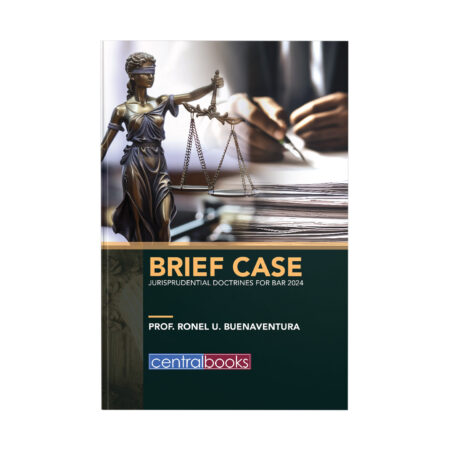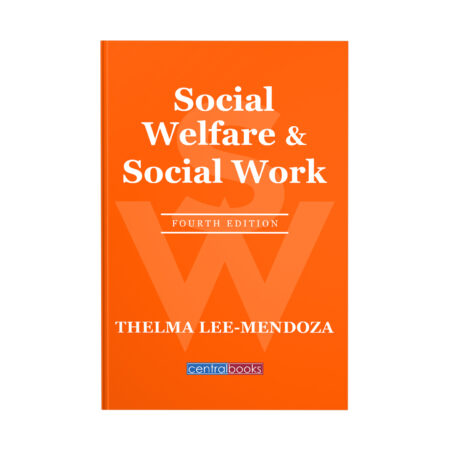-

Ratio Legis: Election Law
₱1,840.00The principal purpose of the Ratio Legis is to reinforce the learning process by providing the student with syllabi notes from choice and selected jurisprudence with the end in view of providing context as well as illustrate the various legal concepts, principles and more importantly — the interpretation and application made by the High Court to various issues raised before It throughout our nation’s socio-political history.
-
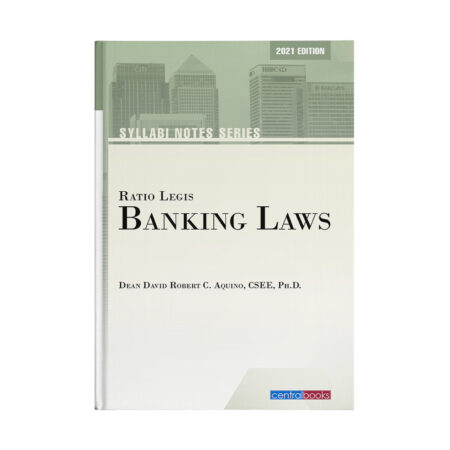
Ratio Legis: Banking Laws
₱1,450.00The principal purpose of the Ratio Legis is to reinforce the learning process by providing the student with syllabi notes from choice and selected jurisprudence with the end in view of providing context as well as illustrate the various legal concepts, principles and more importantly — the interpretation and application made by the High Court to various issues raised before It throughout our nation’s economic and banking history.
-
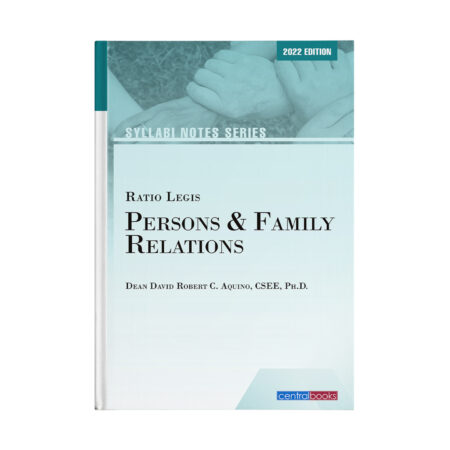
Ratio Legis: Persons & Family Relations
₱1,380.00The principal purpose of the Ratio Legis is to reinforce the learning process by providing the student with syllabi notes from choice and selected jurisprudence with the end in view of providing context as well as illustrate the various legal concepts, principles and more importantly — the interpretation and application made by the High Court to various issues raised before It touching on our core values on Family and its related issues and concepts.
-

Ratio Legis: Statutory Construction
₱1,280.00The principal purpose of the Ratio Legis is to reinforce the learning process by providing the student with syllabi notes from choice and selected jurisprudence with the end in view of providing context as well as illustrate the various legal concepts, principles and more importantly — the interpretation and application made by the High Court to various issues raised before It throughout our nation’s socio-economic and political history.
-

Ratio Legis: Legislative Inquiries
₱1,680.00The principal purpose of the Ratio Legis is to reinforce the learning process by providing the student with syllabi notes from choice and selected jurisprudence with the end in view of providing context as well as illustrate the various legal concepts, principles and more importantly — the interpretation and application made by the High Court to various issues raised before It throughout our nation’s socio-political history.
-

Ratio Legis: Academic Freedom
₱1,080.00The principal purpose of the Ratio Legis is to reinforce the learning process by providing the student with syllabi notes from choice and selected jurisprudence with the end in view of providing context as well as illustrate the various legal concepts, principles and more importantly — the interpretation and application made by the High Court to various issues raised before It throughout our nation’s socio-political history.
-
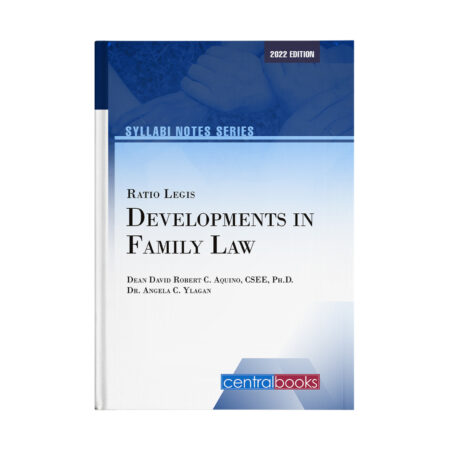
Ratio Legis: Development In Family Law
₱1,450.00The principal purpose of the Ratio Legis is to reinforce the learning process by providing the student with syllabi notes from choice and selected jurisprudence with the end in view of providing context as well as illustrate the various legal concepts, principles and more importantly — the interpretation and application made by the High Court to various issues raised before It throughout our nation’s socio-political history.
-

Introduction to Philippine Legislation
₱1,750.00It is the author’s humble opinion that there is a need to allocate more time, more attention, and more appreciation to legislation (its intricacies, constitutional bearings, and relationship with the laws it produces) to engender a deep understanding of how laws work, how they are to be applied. This is an unassuming reference material for use in the study of Philippine legislation; it humbly provides the student of law and anyone interested in the intricacies of our legislative process with the requisite working knowledge.
-

Handbook on Local Legislation
₱1,420.00This work seeks to present selected provisions of the Local Government Code related to local legislation to serve as a quick reference guide and material for members of the sangguniang barangay, the sangguniang lungsod, the sangguniang bayan and the sangguniang panlalawigan — including other stakeholders that have an interest and participation in nation building and development.
-

The Philippine Constitution
₱1,420.00This humble work seeks to present the 1987 Philippine Constitution in a sort of outline form. Noticeable throughout this modest manuscript is the presentation of the salient provisions of the fundamental law and highlighted, when possible, with pertinent jurisprudence.
-
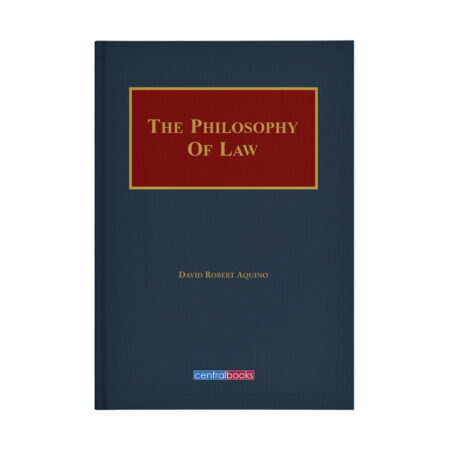
The Philosophy of Law
₱1,280.00This humble work makes a very conscious effort in presenting and discussing philosophical concepts through their manifestation in the more tangible legal and political systems that we are more familiar with. Thus, instead of the usual exposition of heretofore nebulous philosophical concepts which was the usual fare in philosophical discussions, the adopted approach in this humble endeavor is to reduce said discussion as to how they influence our legal paradigm as we know them today — through the use of established jurisprudence rich in philosophical discussion shared by our esteemed jurists. In short, this work approaches the unknown — through ideas, systems and perceptions that are familiar to us — with the end in view of grasping and appreciating the dynamism between legal philosophy — its concepts, principles and schools of thought, with the development of our system of laws.
-
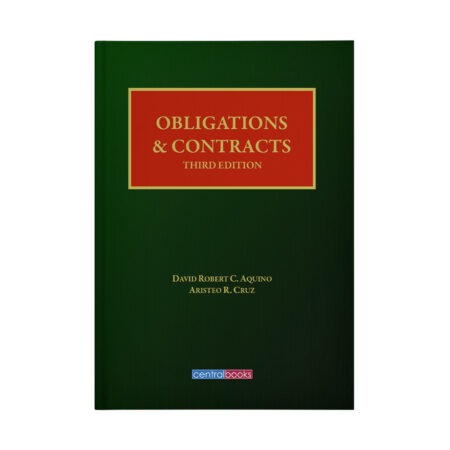
Obligations and Contracts (Third Edition)
₱1,280.00With the continuing support and encouraging reception of students, colleagues and readers alike, it is with the authors’ original approach, that this work presents the provisions of the law on obligations and contracts under the Civil Code in the simplest way possible for easy understanding and comprehension. The nature, meaning and application of the provisions using established legal concepts, and whenever appropriate — applicable jurisprudence, are discussed in this book. It also indicates recommended readings at the end of each Chapter with the end in view of assisting the learning process leading the student of law to discover the import of the law on his own terms — thus, providing the learning reinforcement needed to understand the law.
-

Statutory Constructions (Third Edition)
₱1,280.00On its Third Edition — this humble work stays true to its humble beginnings and original purpose — providing references on the principles and concepts of statutory construction, highlighting when appropriate, through the use of specially selected cases.
-
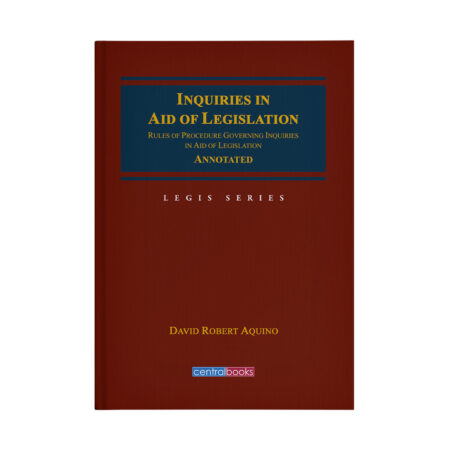
Inquiries in Aid of Legislation
₱1,280.00Be that as it may, inquiries in aid of legislation is a legitimate aspect of the legislative function of Congress — be it exercised by either chambers.
-
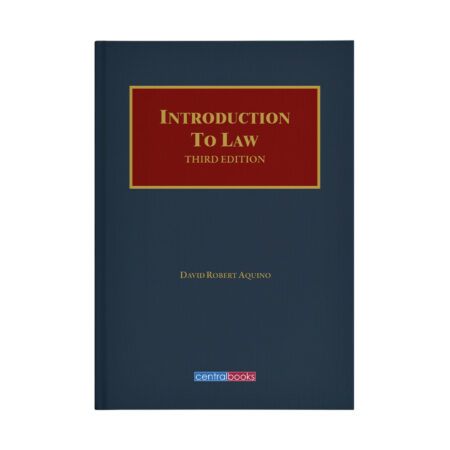
Introduction To Law (Third Edition)
₱1,420.00This book is envisioned as an introductory guide — a sort of compass with the end in view to help new students take those steps as you traverse the intricate and wonderful world of legal studies. This work is designed to introduce not only incoming students of law but anyone interested to acquire a working knowledge of our country’s statutory regime. This humble work also includes a Student’s Guide, found in this section which will provide suggestions and tips on how to use the SCRA and other resource materials as well as how to digest assigned cases properly.
-

Alternative Dispute Resolution
₱1,680.00This book include a chapter on ADR mechanisms in the judicial front, namely: the Court-Annexed Mediation (CAM), Judicial Dispute Resolution (JDR), Judicial Dispute Resolution on Appeal (JDRA), and Appellate Court Mediation (ACM), to provide readers with a comprehensive understanding of ADR processes in and out of the court trial system and the manner that they complement each other.
-
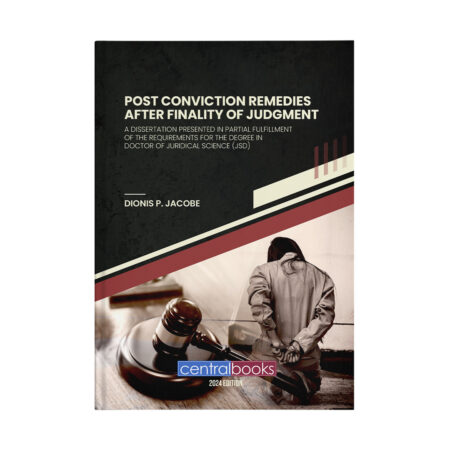
Post Conviction Remedies after Finality of Judgment
₱920.00Judge Dionis P. Jacobe wrote a dissertation entitled “Post-Conviction Remedies after Finality of Judgement” for the degree Doctor of Juridical Science (JSD) at the Graduate School of Law of San Beda University. His panel of examiners lauded the dissertation as a salutary proposal to remedy an existing lacuna in the law.
-

Compendium on Customs Disposal Processes
₱1,180.00The Compendium on Customs Disposal Processes is a comprehensive reference designed for individuals seeking a thorough understanding of the relevant provisions of the Customs Modernization and Tariff Act (CMTA), Tariff and Customs Code of the Philippines (TCCP), as amended, Customs Administrative Orders (CAOs), Customs Memorandum Orders (CMOs), and related laws, rules, and regulations. This reference material is essential for those working in public service, as well as stakeholders, professionals, and students seeking to enhance their expertise in the field of Customs Disposal Processes.
-

Dispute Resolution and Crisis Management in the 21st Century
₱580.00The 21st century has presented us with unprecedented global challenges and opportunities. As our society becomes increasingly interconnected and complex with the fastpaced technology, the need for effective dispute resolution and crisis management has never been more vital. This book provides its readers a ready reference material into the critical issues, exploring the dynamic landscape of conflict, crises, and their resolution in the modern times both in legal and law enforcement perspectives.
-

Philippine Election Law
₱1,750.00In writing this final book in the Laws on Public Administration trilogy, the expanse volume of statutes, particularly amendatory laws passed after the Omnibus Election Code and the present Constitution, pertinent resolutions of the Commission on Elections, and important jurisprudence, presented a challenge to produce a comprehensive yet readable work for the law student and the election lawyer.
-

Question and Answer on the Revised Corporation Code
₱1,950.00This edition not only revises and expands on the original text but also incorporates new legal precedents and interpretations that have emerged in the dynamic field of corporate law. The goal is to provide readers – whether they be students, legal practitioners, academics, business professionals or members of the bench – with a comprehensive and up-to-date understanding of the Revised Corporation Code.
-
-10%

Bar Exam Logic
₱702.00 – ₱882.00This book serves as a foundation for excelling in the Bar exam and beyond. It guides you through the intricacies of legal logic, argumentation, reasoning skills, and the avoidance of common pitfalls, with practical examples and model answers linking theory to practice.
-
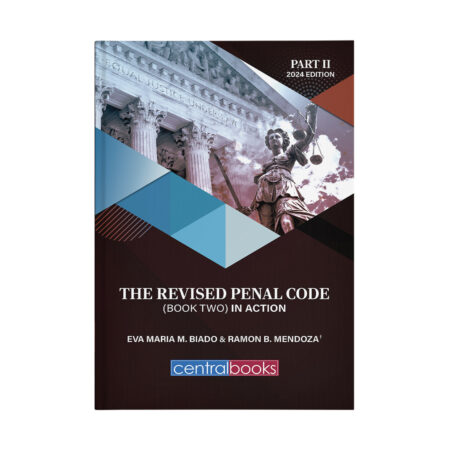
The Revised Penal Code (Book Two) in Action: Part 2
₱1,880.00The book also contains a comprehensive but easy to understand explanation of each crime, particularly, its nature, elements, and distinctions with other related crimes. It is loaded with illustrative cases, old and new. There are also a lot of examples and bar questions with answers based on prevailing jurisprudence to pique the mind and challenge one’s analytical thinking.
-
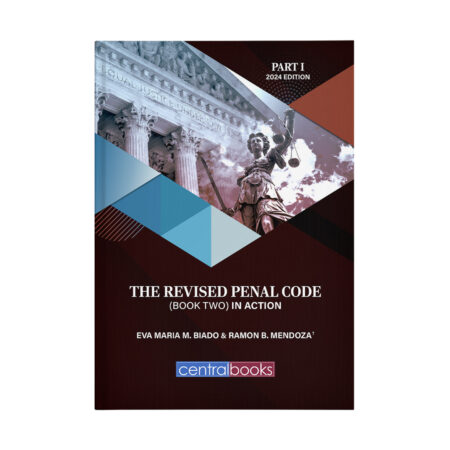
The Revised Penal Code (Book Two) in Action: Part 1
₱1,880.00Aptly titled “The Revised Penal Code (Book Two) in Action,” this book, which we wrote during a season of upheaval, is distinctive from the rest because it is the fulfillment of our long-planned venture into the complexities of the Revised Penal Code and related special laws.
-

Dispute Resolution and Crisis/Incident Management
₱580.00The course begins by delving into the fundamental ideas of arbitration, mediation, and reconciliation through a combination of lectures, case studies, and interactive discussions. Participants are immersed in a learning experience meant to create a sophisticated understanding of these strategies, creating the framework for effective conflict resolution.
-
-10%
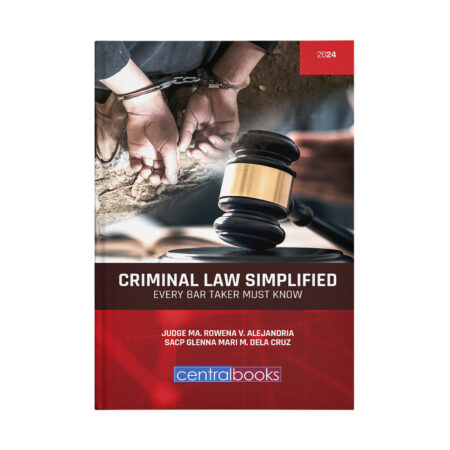
Criminal Law Simplified
₱882.00 – ₱1,125.00Criminal Law is a branch of public substantive law which defines what a crime is and imposes a penalty. Being a substantive law, it creates a right, the right of the state to impose a penalty. If there is a right violated, there is a crime.
-

Constitutional Law
₱2,350.00This edition constitutes the writer’s continuing fulfillment of his promise made to the author — a pledge made by a son to his father — to keep this, his book, refreshed and relevant.
There has been a deliberate discarding of paragraphs and pages, done principally as an effort toward brevity and relevance. But there is as well found in this volume many new sentences on the many new cases and laws that have been pronounced or promulgated since the last publication of this book. They have been written here also for relevance.
-
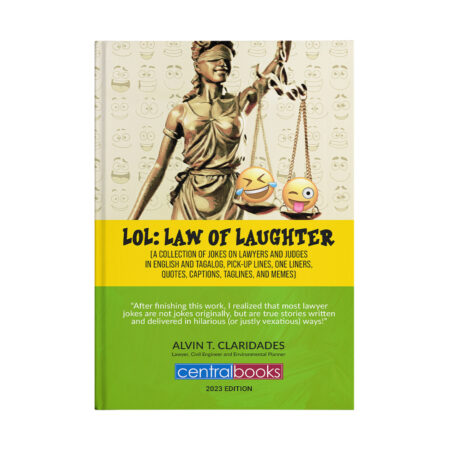
LOL: Law of Laughter
₱850.00For a change, this writer has veered away from the usual subjects he dabbles on.
Having read and gotten himself amused by lawyer tales and witticisms in all forms of media led him to venturing into putting in one tome his huge collection of jokes on lawyers and judges – in English and Tagalog – pick-up lines, one-liners, quotes, captions, taglines, and memes.
-
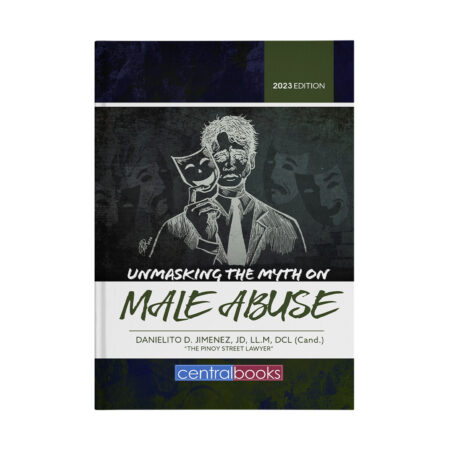
Unmasking the Myth on Male Abuse
₱880.00This book seeks to illuminate the often-hidden reality of violence against men, exposing the gaps in existing domestic violence laws and advocating for a reevaluation of these statutes, including Republic Act 9262.
-

Notes and Cases in Remedial Law (Evidence) Vol. IV
₱2,050.00Per A.M. No. 19-08-15-SC effective May 1, 2020. It traced the origin of the new provisions and basis of the amendments from the Federal Rules of Evidence of the US. Each Rule and section/s are highlighted by the decisions of our SC, and in the absence thereof by the US-FSC decisions and the Notes from the US congress. Reliable text book for law students taking Evidence, Remedial Law Review and Reviewees preparing for the Bar. Useful to trial lawyers and the bench.
-

Notes and Cases in Remedial Law (Civil Procedure) Vol. I Part 4
₱2,050.00It covers the Rules 57 to 71 (Provisional Remedies and Special Civil Actions) with enlightening comments on each rule. Undoubtedly, it will serve as a useful and enlightening reference not only for the Bar Reviewees but for every practitioner of law.
This law book contains the latest jurisprudence, principles and commentaries that one can use in the pursuit and advancement of his career in the legal profession.
-

Notes and Cases in Remedial Law (Civil Procedure) Vol. I Part 3
₱1,850.00It covers Rules 40 to 56 of the 1997 Rules of Civil Procedure. Undoubtedly, it will serve as a useful and enlightening reference not only for law students and Bar Reviewees, but for every practitioner of law.




